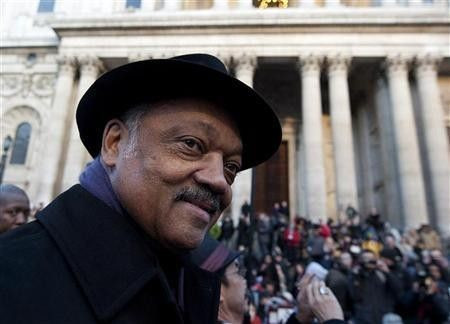Why Is Rev. Jesse Jackson In Morocco?

The Rev. Jesse Jackson took a break from his public expressions of outrage over the acquittal of George Zimmerman in the killing of Trayvon Martin to journey to Morocco for a five-day visit. According to a report in the Maghreb Arabe Presse (MAP) news agency, the civil rights leader met with King Mohammed VI at the royal palace in Rabat.
Jackson apparently “congratulated” Morocco's king for implementing various reforms that have allowed the North African Kingdom to avoid the “Arab Spring” turmoil that has swept across the region over the past two years. Jackson also praised Morocco as a “model” for the whole region and particularly congratulated the monarch for improving infrastructure in the southern parts of the country while moving toward democracy.
In return, His Majesty commended Jackson as a “militant and pioneer” and for his “tireless action for the promotion of civic rights and defense of minorities.”
According to a report in the National Newspaper Publishers Association (NNPA), a U.S.-based organization affiliated with BlackPressUSA, Jackson delivered a speech at the Ministry of Foreign Affairs and Cooperation in Rabat, declaring: “This region has seen the Arab Spring uprisings all around: Tunisia, Egypt, wars in Libya, and Syria. Many acted with unpreparedness and without defined instructions and a foundation to build a unified, democratic future.”
Jackson added: “Morocco has responded with wisdom and achieved excellent results: It met the Arab Spring uprising by expanding democracy -- a new Constitution, a renewed commitment to human rights, a commitment to economic growth and social unification. That’s why Morocco today is stable, your democracy is maturing, and you are building institutions to govern your future political, economic and social life.”
The MAP report noted that Jackson was on a “work visit” to Morocco. In addition, Jackson, who holds no official U.S. government post, met with Moroccan government officials to “review” bilateral relations between the U.S. and Morocco, while calling for deeper partnerships.
Jackson also described Morocco as a “great untold story,” criticizing the [Western] media for only reporting on negative developments in the Middle East and North Africa. “The media covers violence and bloodshed and war every day,” he said. “But I submit that peaceful, non-violent resolution of conflicts, sustained economic growth -- these are the waves of the future that also deserve media coverage.”
Jackson even waxed poetic about Morocco’s conflict with Algeria over the Western Sahara, which Morocco claims as its own and where it has fought an insurgency for more than 40 years. “When differences and conflicts arise, reasonable people can work it out peacefully, and not fight it out with violence,” Jackson said. “If blacks and whites in South Africa could work it out; if East and West Germany could work it could, then surely Morocco and Algeria can work it out.”
However, the NNPA report also indicted that Jackson met on Monday with human rights activists, who complained about continuing abuse by the authorities, including police violence against demonstrations, official corruption, lack of transparency, prison abuse and postponements in implementation of the new constitution.
Jackson has made many trips over the decades to Africa and the Middle East, most notoriously embracing and hugging such figures as Moammar Gaddafi in Libya and Yasser Arafat, chairman of the Palestinian Liberation Organization.
Some of his overseas voyages were “official” visits, others were simply as private citizens. For example, in October 1997, President Bill Clinton and Secretary of State Madeleine Albright appointed Jackson as "Special Envoy of the President and Secretary of State for the Promotion of Democracy in Africa.” Under that title, Jackson traveled to many African nations, meeting with such figures as Nelson Mandela of South Africa, Daniel T. Arap Moi of Kenya and Frederick J.T. Chiluba of Zambia.
© Copyright IBTimes 2024. All rights reserved.





















